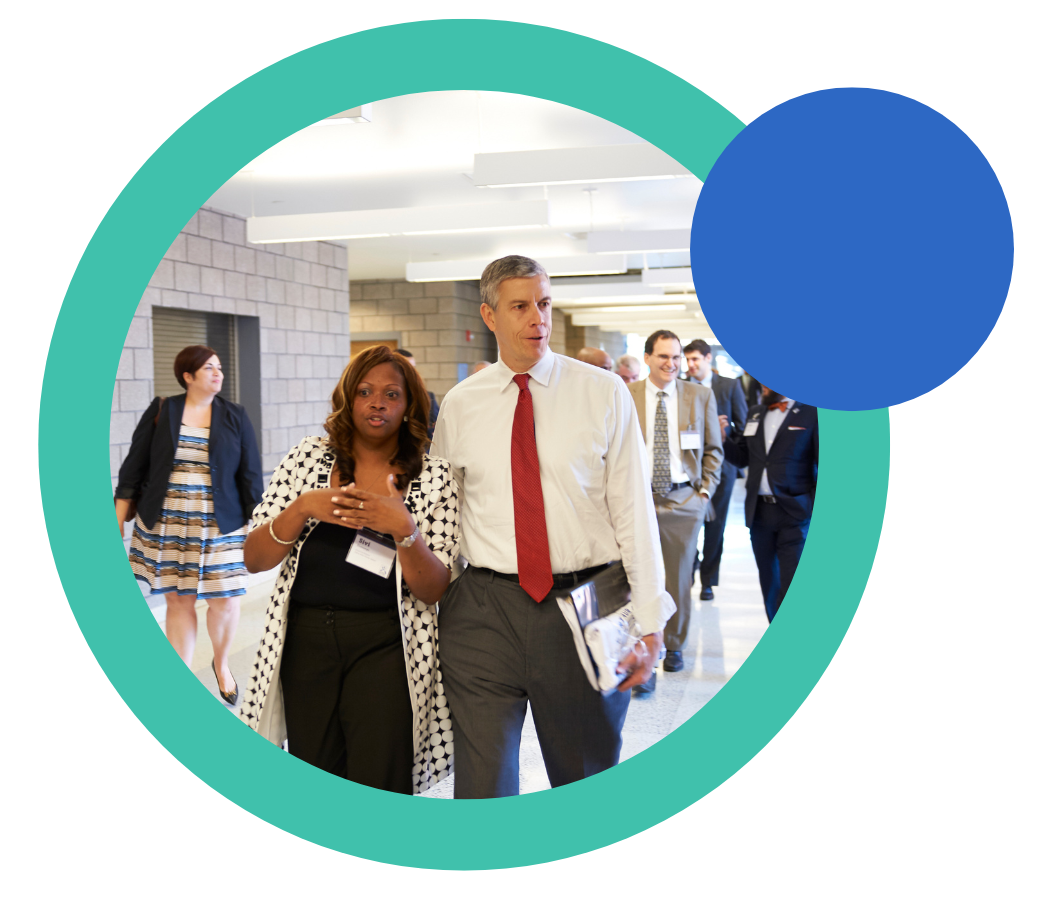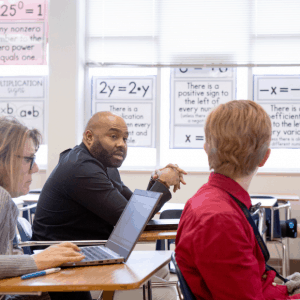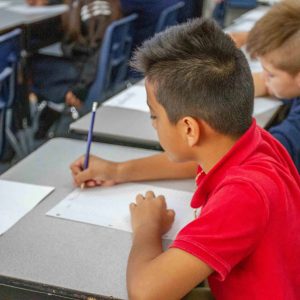Promising Evidence of Impact from Teacher Professional Development
09/30/2024
School districts nationwide invest 3-5 percent of their budgets each year in developing their educators. Yet, professional development programs often fail to improve teachers’ instructional practice or student achievement (Kraft et al., 2018).
- In the 2016-17 school year, U.S. spending on public elementary and secondary schools totaled $739 billion, or $14,439 per public school student (National Center for Education Statistics).
- By comparison, the annual cost of teacher professional development to districts was $22-37 billion, or $433-722 per public school student.
Despite these disappointing trends, there is reason for hope.
A recent meta-analysis found that professional development programs focused on teacher coaching can improve teacher practice and student achievement if they share several programmatic features, including job-embedded practice, an intense and sustained duration of teacher coaching and professional development, a focus on discrete instructional skills, and active learning (Kraft et al., 2018).
 As a researcher, I am interested in the relationship between research and practice. So, when Leading Educators—a non-profit that helps schools design systems for standards-based professional learning—invited me to join its evaluation advisory board (EAB) in February 2020, I accepted.
As a researcher, I am interested in the relationship between research and practice. So, when Leading Educators—a non-profit that helps schools design systems for standards-based professional learning—invited me to join its evaluation advisory board (EAB) in February 2020, I accepted.
Since then, I have advised Leading Educators on a project funded by the Carnegie Corporation of New York to develop empirical evidence on how improvements in teacher practice in math and English language arts impact student learning. I also supported an impact evaluation of the organization’s teacher fellowship model. In this commentary, I describe this new research and the role of researcher-practitioner partnerships.
strengthening Evaluation Design
 During the 2015-16 and 2016-17 school years, Leading Educators’ teacher fellowship model provided standards-aligned, teacher-driven professional learning to teachers in select schools across four regions: the greater New Orleans and Baton Rouge, the greater Kansas City area, the Washington, D.C. metro area, and the greater Memphis area.
During the 2015-16 and 2016-17 school years, Leading Educators’ teacher fellowship model provided standards-aligned, teacher-driven professional learning to teachers in select schools across four regions: the greater New Orleans and Baton Rouge, the greater Kansas City area, the Washington, D.C. metro area, and the greater Memphis area.
Within the teacher fellowship model, select teachers and school leaders attended approximately two weeks of professional development in the summer prior to the start of the fellowship along with four workshops throughout the school year. Additionally, teacher leaders met monthly with a leadership coach for one-on-one support. These teacher leaders then provided frequent, content-based planning and practice for other educators in proximate grades. Some teacher leaders chose to enroll as individuals, and some school leaders chose to enroll several teacher leaders and participate alongside them. In a few cases, district or charter management organization leaders also participated in some of the fellowship programming, though there was not yet any specialized programming for these roles.
Several years after the transition to a district partnership approach and in light of existing evidence, Leading Educators sought to contribute to the broader research on teacher professional development through a rigorous internal impact evaluation of the teacher fellowship model.
Starting in Spring 2021, I partnered with Ariana Audisio and Rebecca Taylor-Perryman to design and implement an internal impact evaluation.
- This partnership reflects Leading Educators’ desire to learn from external researchers to supplement and support organizational research and evaluation capacity.
- It also recognizes an intention to be internally transparent about the efficacy of its various models and to contribute new knowledge to the field of teacher professional development more broadly.
Identifying Causality
Throughout the remainder of 2021 (and into 2022), I supported all phases of the evaluation, including conceptualization, data collection, and analysis. We worked together to construct a detailed school-by-grade-by-year dataset, incorporating administrative data from multiple external sources (e.g., NCES Common Core of Data; state administrative databases) and internal data, including information on the saturation—the share of a school’s teachers participating in the fellowship model—and duration of Leading Educators’ fellowship model.
Relying on quasi-experimental methods for causal inference (i.e., difference-in-differences and event study strategies), we find that a school’s participation in the fellowship model increased student proficiency rates on math and English language arts (ELA) state achievement exams by 8.5 and 5.3 percentage points, respectively.”
- Further, student achievement benefitted from a more sustained duration of teacher participation in the Leading Educators fellowship model (i.e., 2 years rather than 1 year).
- The impact on student achievement was larger when the share of a school’s teachers who participated in the fellowship model was smaller and when teachers independently selected into the fellowship model compared to teachers that were appointed to participate by school leaders
Takeaways
- By conducting a rigorous impact evaluation, Leading Educators acknowledges the importance of understanding the aspects of its service provision—and the locations in which those services are provided—that may be most effective for improving teacher professional practice and student performance.
- The evaluation highlights the importance of organizational transparency in understanding the most effective elements of program design and implementation and those that require revision.
- Leading Educators’ evaluation also aims to inform other organizations on the design and implementation features related to improving teacher professional development and, ultimately, student learning, and is a “call to action” for organizations to intentionally and rigorously examine their operations.
It is through this organizational self-reflection and continual learning, and the intentional partnership with external researchers to supplement research capacity, that organizations like Leading Educators can best support teachers in school communities serving our nation’s students.





